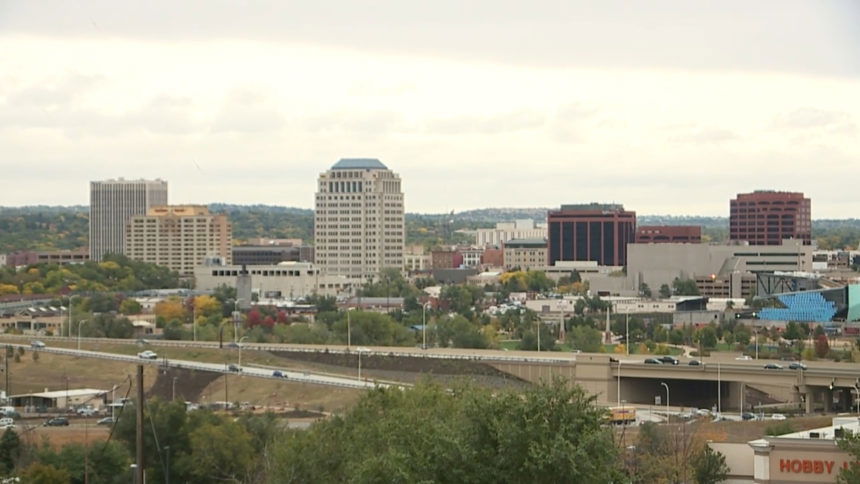Colorado Springs cost of living above national average

We all know Colorado Springs is expensive, but exactly how far does your dollar go? A new study released this month by the Council for Community and Economic Research says the cost of living remains above the national average.
Although high, the cost of living remained unchanged in the third quarter after rising every quarter for the past two years. In the third quarter it remained at 100.9% of the national average, according to that survey.
The study found our cost of living isn't far behind Denver's. It weighed the average cost for groceries, housing, utilities, transportation, health care and others.
In fact, it's the highest it's been in over a decade, so we took to the city to hear from people actually being affected.
"The cost of living has gone way up. Taxes have gone up, property taxes have gone up," said Shawn Mckenna.
"Gas is definitely more expensive here without a doubt, [and] groceries; it all depends on the areas where you shop, to be honest," said Alex Vargas, who is originally from Texas.
"The rent was much lower just a matter of months ago, so I can see things are definitely changing," said another local.
UCCS Economic professor Tatiana Bailey says she believes it's all because of the city's growth, which then becomes a problem when wages aren't keeping up.
But Vargas says he doesn't fall under that statistic.
"I'm almost 1,000% sure I'm going to die old here because it is a nice place to live. It's worth it because of the amount I get paid so it balances out," he said.
While many others say it's simply not the city it was several years ago.
"When I grew up it was a small town and so to live in a city like this is not something I prefer, in fact I'm moving," one local said.
"I'm going back east. When I first came here was in 1975, raised a family here. You could afford to live here," Mckenna said.
It's a problem we continue to cover. With fewer high-skilled jobs in our city, higher salaries are also lacking. It's something the city and our mayor have brought attention to before and say they continue to work on.
While Colorado Springs still remains a cheaper alternative to Denver, Pueblo is the most cost-effective city in Colorado, with cost of living below the national average.
During the April-to-June quarter, it was the first time the cost of living had risen above the national average since 2000.
We sat down with UCCS Economic professor, Tatiana Bailey, to discuss the cost of living.
What goes into measuring the cost of living?
Bailey: "For the local cost of living, it mostly focuses on six items like housing, groceries, utilities and it is a good indicator generally of what people are paying out of pocket consistently on a monthly basis."
How does our cost of living in Colorado Springs compare to other cities?
Bailey: "It has started to pick up, but it's still not as high as you would think given the low unemployment rate. Given the good economy and the fact that Colorado Springs is growing I'm not surprised the cost of living has edged up. It has edged up for a lot of good reasons, we have really good economic growth here in the last four or five years."
Is there a downside?
Bailey: "The downside is that it starts to squeeze out people who may not have equity or maybe they're early on in their career or maybe not making as much and have liabilities, like new car payments, rent and so forth. Some people are doing just fine still, but especially that younger generation I think is really struggling."
How do population growth and wages affect the cost of living?
Bailey: "Interestingly enough we were one of the top cities int he United States with an influx in young people, which is great but a lot of that is because we're not as expensive as Denver-Boulder but that's starting to change. Now being at 101, almost of the national average with 100 being the national average, isn't disastrous by any means but you have to look at the other side of the court. What are salaries here? And that's where we start to get into a little bit of trouble. We have a long legacy of having wages well below the national average, about 14% below."
When you're conducting these studies on our economy, what are some of the cities you look at?
Bailey: ?I believe Boise, Idaho is pretty much on par in the U.S. in terms of wages and yes their cost of living is also escalating because they're growing, but still really affordable. Another one I look at is Salt Lake City, they're very similar to us in many different ways. They're really good about building up their infrastructure and they spend a lot more on transportation. Huntsville - maybe not experiencing quite the growth we are, but they are a big military community so it's similar int hat way."
How do we fix the problem of low wages while keeping the cost of living low?
Bailey: "Getting good talent and keeping working-age people is going to be critical for our continued economic competitiveness. So what cities are going to do well? Those are going to be the ones that are not too expensive and have good wages. We have the growth, we have jobs out there now and the young people. If we don't have the wages to attract them and to keep them here and costs continue to escalate, that's where you start to see some migration and that's the last thing you want."
